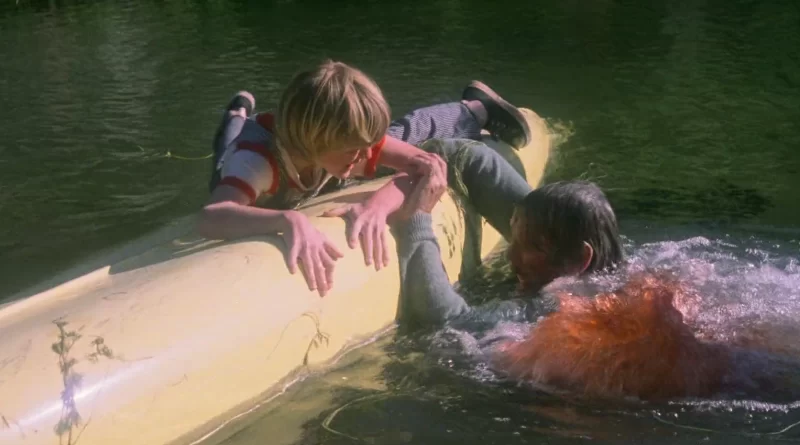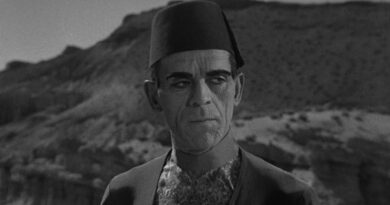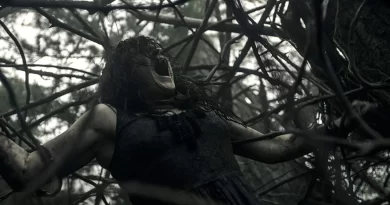Piranha (1978)
Piranha, which has nothing to do with William Gibson’s 1972 film of the same name, is the latest of several underwater monster movies capitalizing off the success of Jaws – including Jaws 2, the inevitable sequel. To its credit, the filmmakers acknowledge this; an early scene shows the female protagonist playing a Jaws arcade game at an airport. But referencing another franchise isn’t enough. Piranha is every bit the derivative, cheaply-made ripoff it appears to be, made worse with a few bad casting choices, a lot of unconvincing makeup and gore effects, and the filmmakers’ inability to decide whether it’s a horror movie with funny scenes or a comedy with scary moments. It doesn’t even take place in the ocean. It’s all set in small, claustrophobic lake and river locations.
The film marks the solo directorial debut of Joe Dante. His previous effort, co-directed by Allan Arkush, was Hollywood Boulevard. It was trash, but trash with a purpose – a B movie about B movies, a satire of the sleazy side of 1970s Hollywood. Even with the nod to Jaws, Piranha doesn’t have that same clever sense of self-awareness. It just goes through the motions with only the hope that audiences will scream and laugh, contradictory as that may be. Was Dante acting under the misguided assumption that the film should be taken seriously? It’s a valid question given the fact that the film was produced by Dante’s mentor Roger Corman, whose own cheaply financed, quickly produced films were usually terrible but at least had their tongues in cheek.
The plot: Maggie (Heather Menzies), a young, barely engaging private investigator on the hunt for a missing teenage couple in a wooded area of Texas, stumbles onto a decommissioned military site and unknowingly releases a pool full of genetically altered piranhas into the local river system. Roped into this, for reasons no better than the narrative obligation to pair a female protagonist with a male, is Paul (Bradford Dillman), a recently divorced single father who has retreated to a tiny, isolated cabin and drowns his sorrows with a booze-filled canteen. At least, that’s the case at the start of the film; as it progresses, his alcoholism is forgotten, because of course the escaped piranhas have forced him on a mission to (1) save his aquaphobic daughter (Shannon Collins) at a lakeside summer camp, and (2) prevent the opening of a river resort.
The piranhas were, as one would expect from a movie so utterly devoid of originality, part of a government sanctioned covert mission. Essentially, the American military wanted a biological weapon that could be used against the North Vietnamese during the war. It always has something to do with the government, and of course the inevitable involvement of the military in this story plays into the cliche that it’s about covering up and denying more than about what’s in the public interest. Anyway, the scientist behind their creation is played by Kevin McCarthy with a similar desperate paranoia he displayed in Invasion of the Body Snatchers. I think this was the sole reason for his casting in Piranha: He was an actor from a famous science fiction/horror movie, so naturally he should appear in another science fiction/horror movie.
The issue is that McCarthy’s character isn’t an homage or spoof. He’s playing it straight, and not convincingly. The same can be said for Paul Bartel and Dick Miller, the latter cast in many Corman movies, both also appearing in Hollywood Boulevard. But that film was obviously made in the spirit of parody. It was therefore permissible for them both be typecasts, one as a director of garbage, the other as a Hollywood agent. In Piranha, they perform as if they were in a serious movie; Bartel is a mean-spirited camp counselor, and Miller is essentially a scaled-down, camped-up version of Murray Hamilton in Jaws – a slick-talking resort owner who places the Almighty Dollar above saving lives from an impending piranha attack.
That’s right – I nearly forgot to mention the special effects, a term I use very loosely and with much incredulity. When it comes to makeup, I can only say I was more convinced by Roddy McDowell and Kim Hunter in ape makeup. The attacked character looked as if the actors playing them were merely smeared with stage blood right before the cameras rolled. The believable wounds were wasted on dummies that were obviously made out of foam rubber. As was the case with Jaws, it’s actually more effective when the fish are unseen and we see only victims flailing in bubbling water rapidly turning red with blood. However, it would have helped if an alien chirping sound didn’t accompany the swarms of fish.
Why was there such a disconnect between the horror and the humor? Horror comedies have been made before, and successfully. I think the issue was that Dante didn’t make a true horror comedy; he made a movie that edited together purely scary scenes and purely funny scenes. There was never a seamless melding of genres. At one point, we witness a father getting pulled underwater by the arm, capsizing the canoe, forcing his terrified son to remain stranded on top. Later on, Menzies and Dillman escape from a local jail by knocking out a deputy and stealing his keys, which necessitates the removal of his pants. The cop car they steal will eventually fly through the air in slow motion, because of course that has to happen. Too many Jaws knockoffs have been made already. We didn’t need another one with Piranha.




